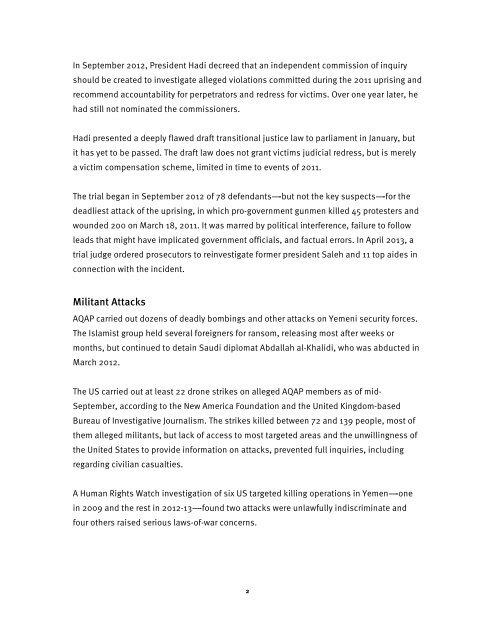You also want an ePaper? Increase the reach of your titles
YUMPU automatically turns print PDFs into web optimized ePapers that Google loves.
In September 2012, President Hadi decreed that an independent commission of inquiry<br />
should be created to investigate alleged violations committed during the 2011 uprising and<br />
recommend accountability for perpetrators and redress for victims. Over one year later, he<br />
had still not nominated the commissioners.<br />
Hadi presented a deeply flawed draft transitional justice law to parliament in January, but<br />
it has yet to be passed. The draft law does not grant victims judicial redress, but is merely<br />
a victim compensation scheme, limited in time to events of 2011.<br />
The trial began in September 2012 of 78 defendants-----but not the key suspects-----for the<br />
deadliest attack of the uprising, in which pro-government gunmen killed 45 protesters and<br />
wounded 200 on March 18, 2011. It was marred by political interference, failure to follow<br />
leads that might have implicated government officials, and factual errors. In April 2013, a<br />
trial judge ordered prosecutors to reinvestigate former president Saleh and 11 top aides in<br />
connection with the incident.<br />
Militant Attacks<br />
AQAP carried out dozens of deadly bombings and other attacks on Yemeni security forces.<br />
The Islamist group held several foreigners for ransom, releasing most after weeks or<br />
months, but continued to detain Saudi diplomat Abdallah al-Khalidi, who was abducted in<br />
March 2012.<br />
The US carried out at least 22 drone strikes on alleged AQAP members as of mid-<br />
September, according to the New America Foundation and the United Kingdom-based<br />
Bureau of Investigative Journalism. The strikes killed between 72 and 139 people, most of<br />
them alleged militants, but lack of access to most targeted areas and the unwillingness of<br />
the United States to provide information on attacks, prevented full inquiries, including<br />
regarding civilian casualties.<br />
A <strong>Human</strong> <strong>Rights</strong> <strong>Watch</strong> investigation of six US targeted killing operations in Yemen-----one<br />
in 2009 and the rest in 2012-13-----found two attacks were unlawfully indiscriminate and<br />
four others raised serious laws-of-war concerns.<br />
2
















